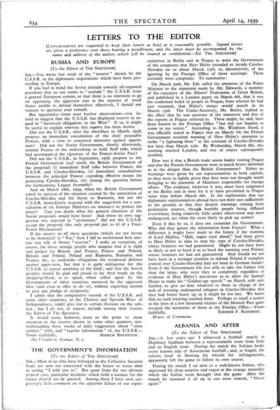LETTERS TO THE EDITOR
[Correspondents are requested to keep their letters as brief as is reasonably possible. Signed letters are given a preference over those bearing a pseudonym, and the latter must be accompanied by the name and address of the author, which will be treated as confidential.—Ed. THE SPECTATOR]
RUSSIA AND EUROPE
[To the Editor of THE SPECTATOR] SIR,—You wrote last week of the " reserve " shown by the U.S.S.R. in the diplomatic negotiations which have been pro- ceeding in Europe.
If you had in mind the Soviet attitude towards oft-repeated assertions that no one wants to " exclude " the U.S.S.R. from a general European system, or that there is no intention to go on appeasing the aggressor axis at the expense of small States unable to defend themselves effectively, I should not venture to question your remark.
But apparently—from your further observations—you in- tend to suggest that the U.S.S.R. has displayed reserve in re- gard to " increased obligations in the West." If so, it might be useful to explain wherein this reserve has been shown.
Did not the U.S.S.R., after the Anschluss in March, 1938, propose an immediate consultation of - the chief peaceable Powers, with a view to concerted measures against aggres- sion? Did not the Soviet Government, shortly afterwards, remind France of the undertaking to hold Staff talks which had accompanied the signature of the Franco-Soviet Pact?
Did not the U.S.S.R., in September, 1938, propose to the French Government (and notify the British Government of the proposal) (i) immediate Staff talks between France, the U.S.S.R. and Czecho-Slovakia, (ii) immediate consultations between the principal Powers regarding effective means for protecting Czecho-Slovakia, (iii) raising the question before the forthcoming League Assembly?
And on March 18th, 1939, when the British Government asked its opinion of the situation created by the annexation of Czecho-Slovakia and the threat to Rumania, did not the U.S.S.R. immediately respond with the suggestion for a con- sultation of six Foreign Ministers on measures to protect the peace? Can you doubt what the general character of the Soviet proposals would have been? And when its own sug- gestion was rejected, as " premature," did not the U.S.S.R. accept the proposal (the only proposal put to it) of a Four- Power Declaration?
If the answer to all these questions (which are not meant to be rhetorical) is " Yes," then I fail to understand how any- one can talk of Soviet " reserve." I make an exception, of course, for those strange people who imagine that it is right and proper fur Britain and France, France and Poland, Britain and Poland, Poland and Rumania, Rumania and France, &c., to undertake obligations for reciprocal defence against aggression, but that it is quite outrageous for the U.S.S.R. to expect anything of the kind ; and that the Soviet peoples should be glad and proud to lay their heads on the chopping-block, so to speak, when called upon by the Governments of other countries menaced by the aggressor bloc (and even to offer to do so), without expecting anyone to give any pledge of reciprocity.
I admit that the comparative records of the U.S.S.R. and some other countries, in the Chinese and Spanish Wars of Independence, might give rise to certain illusions on the sub.. iect ; but I do not, of course, include among their victims the Editor of The Spectator.
It would seem, however, more to the point to draw attention to the reserve shown in some other quarters, not- withstanding three weeks of daily suggestions about " close contact " with, and " regular information " of, the U.S.S.R.-






































 Previous page
Previous page